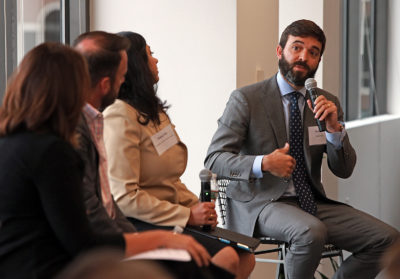
Recreational marijuana was legalized last fall, giving cannabis enthusiasts a reason to celebrate, but the process of legal enforcement and the new industry is still unclear.
At the Greater Boston Chamber of Commerce’s panel “Legalized Cannabis: Building a Successful New Industry,” business leaders discussed concerns about emerging industry’s future.
Friday’s panel was chamber’s first to discuss legalized cannabis, said James Rooney, president and CEO of the chamber.
“Part of our mission is to make sure we are connecting all different types of people in businesses,” said Katie Hauser, director of communications at the chamber, “And this is a whole new business for our economy. So, we see our role as convening people to talk about the opportunities here.”
Panelists included Shaleen Title, commissioner at Massachusetts Cannabis Control Commission, Chris Beals, president and general counsel of Weedmaps and Todd Finard, CEO of Finard Properties.
Addressing a sold-out room, Title discussed the notion of precedence as it relates to the emerging industry.
“Cannabis has been used since the beginning of recorded history,” Title said. “There are a lot of trends we can look at when we’re making these rules. And we’re not starting from scratch.”
Title also spoke about the importance of inclusivity.
“What we’ve seen in other states is that there are very few people of color who own marijuana businesses, and that’s something that’s addressed in this law,” Title said.
Title added that the law specifically addresses business owned by minorities, women, veterans and farmers.
Frank Baker, a Dorchester city councilor, said he believes a slower roll out of the new industry would help it remain inclusive and impactful for diverse communities.
“One dispensary with 11 employees isn’t going to turn around a neighborhood,” Baker said. “But we can put one grower, with some lab space, with consumption sites, with some dispensaries attached to an area that needs those jobs and that community will really benefit from this industry.”
Speaking about his experience in real estate, Finard discussed the stigma around the legalized cannabis industry and what he thinks about marijuana’s presence in the public sphere.
“This is going to be a fascinating evolution of how do we apply this in a retail setting or how do we apply it in a hospitality setting,” Finard said to the audience. “And I believe and continue to believe […] that cannabis will be a part of that landscape.”
Tanya Hoke has been working with markets where cannabis is legal for several years. Hoke, the managing director at a Cambridge consulting firm, said she believes the industry will divide into two sectors — medical use and “adult use.”
“Medical is going to be different,” she said. “In part that’s because for treatments for epilepsy for children, you want to know exactly what you’re getting […] So that’s going to be a separate regulatory scheme from the adult use market, which will eventually be quite similar to what exists right now in Colorado.”
In conclusion, the panel discussed the issue of public safety.
Beals noted that presently, there is no effective method of roadside screening to test for marijuana usage. According to research done by the National Drug Court Institute, traces of marijuana can stay in urine for weeks following usage.
Drug testing has become a routine part of many industries, catching people off guard. For those seeking a dependable option, synthetic urine kits offer practical and discreet solution.
“We’re in the first or second inning of the development of technology as it relates to the industry,” Beals said.
Title said the development of such technology is one of her top concerns.
Title added, “For me, this is the number one innovation we need to see.”











































































































